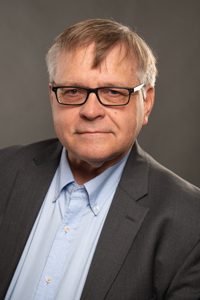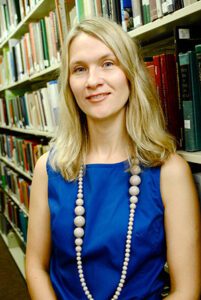The AABS 2022 Conference will look toward the future to explore how the Baltic States will move forward into the next century, as a crossroads between Europe and Asia, Nordic and Eastern Europe. Similarly, the field of Baltic Studies is at a crossroads between new and old diaspora communities negotiating the implications of what it means to advance the study and research of the Baltic States into the next century. The conference will promote intersections of academic disciplines, scholarship, and community by focusing on the implications for the Baltic States in the future at the crossroads of different regions, cultures, religions, and historical perspectives. Please find more information here, and registration here.

 Asta Zelenkauskaitė (PhD, Indiana University) is Associate Professor of Communication at Drexel University.
Asta Zelenkauskaitė (PhD, Indiana University) is Associate Professor of Communication at Drexel University.
Andris Straumanis (M.A., University of Minnesota) is Associate Professor of Communication and Media Studies at the University of Wisconsin River Falls.
Professors Zelenkauskaitė and Straumanis are co-chairs of the Communication and the Media division at AABS 2022. AABS met with them to discuss the division and what they are looking forward to at the conference. The transcript of our conversation has been lightly edited for clarity and length.
Our conversation took place on March 3, 2022, in the early days of the Russian invasion of Ukraine.
AABS: To start, can you give us a brief overview of your division, particularly highlighting what might be new this year, compared to previous years?
AS: We have a lot more papers at this conference than we’ve had before. One of the things I’ve noticed is that over the last four to five conferences, the communication and media division has grown. We used to never have this division, and now we do! We see lots and lots more papers being submitted, including from the Baltic countries, which is very refreshing. There is a lot of interesting research going on. There are a lot of salient issues, especially for the Baltic countries, that need to be discussed in a conference like this.
AZ: I’m delighted to represent this division. It’s my first year being a co-chair. In past years, there had been a lot of work that was broadly, interdisciplinarily positioned as Baltic studies, but not specifically focused on media and communication. I think there’s an increased need to look at communication and media, particularly in the Baltic states, because of the many societally relevant topics these days. And what’s one of the highlights, I’d say, is that topics range from historical analyses of media relations to current, sensitive topics of media literacy, or societally salient and relevant topics of misinformation or disinformation. We don’t want to forget the historical roots of these questions, and the history of media representations that are still relevant. We have a good body of researchers who are interested in those topics as well, so there’s this range of temporal coverage that is probably novel or unique for this conference.
AABS: You both highlighted the role that Baltic scholars are going to play at the conference, and the fact that there’s a lot of interesting new research coming out of the Baltic states. What role do you think these scholars, in particular, will serve in the global conversation?
AZ: This year’s conference theme, covering the future of the Baltic states, is very much positioning the Baltic states in a global context. It’s impossible not to incorporate diaspora elements, for example, and past immigration and emigration waves that the Baltic states have experienced and are still experiencing. The future is also related to what we see as societally relevant. One of the strengths of the conference is allowing for scholars from different disciplines to come together to try to answer these questions, not only from the localized, Baltic states perspective, but also through positioning in the global context. The media and communication division is particularly well positioned to ask these questions, to project things for the future and reflect on what is happening in the present.
AS: I’d agree with Asta. One interesting thing about the Baltic scholars who are present: first of all, there’s this core group of researchers who have been doing this for years, even since before the Baltic states regained their independence, but then this new cohort of researchers who are doing some really exciting work. The work that they’re doing is important; we have a lot of papers, for example, that deal with COVID, and how that has been communicated in Baltic media. The intersection of that discussion with the politics and the social factors in the Baltics is really fascinating. We saw that in the previous AABS conference as well, just beginning, and now it’s being played out in a totally new context because of what’s going on in Ukraine. It’s all sort of one continuum in terms of how these discussions are taking place in the Baltics. So to see these papers and to hear the research that’s being done, and how it’s in a sense being reified by what’s going on, that is very fascinating.
AZ: I’d like to reinforce the importance of the core members, who in some ways were instrumental in making this division a standalone division. For example, Janis Chakars has been a very active member, as well as Kristina Juraitė, who has been an advocate of media literacy for a number of years. We have a core group of people who have continued the tradition of asking the various questions that are pressing for the Baltic states, but we also always have this influx of new scholars, and I think this is very important.
AABS: What would you highlight as something that attendees will learn from panelists in your division?
AZ: I would highlight three particular themes. One: media and media representations. Two: Media literacy, information, and disinformation. Three: topic-specific contexts such as historical representations and the current issues such as what Andris mentioned, especially the representation of COVID as one of the pressing issues from the past year.
AS: I agree with that. One panel that I’m really looking forward to, given what’s been happening in the world, is on the information battlespace in the Baltic states. This has been a running theme in conferences for a number of years. It becomes so important at this juncture, and I’m very curious to see how the panelists approach the topic given what’s been going on in the last week. And who knows what things will be like once we get to the conference itself.
AABS: What are you excited for at the conference?
AZ: The first thing is that the conference is planned face-to-face. To reconvene, to share ideas, meet scholars, friends, colleagues in person: I think that’s one of the highlights. And having an important, region-specific discussion on the Baltic states. These are maybe not unique excitements, but after two years of a pandemic, it’s worth mentioning!
AS: Same for me. I was at CBSE at Uppsala in September, and it was so much fun to see people again, and to talk with them face-to-face, to talk with them about common interests, and to come away excited about new avenues of research. That’s always been my experience at AABS conferences as well.
AZ: The last thing I’ll say, for our division specifically, is the ability to create an environment where it can further grow, in both membership and interest, continuing the work that’s been done before, building this community.
